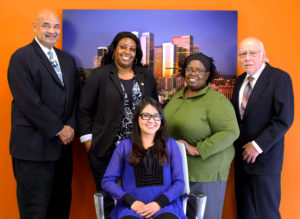Angelus Plaza says ‘Welcome’ in many Languages and Ways

Angelus Plaza Senior Activities Center staff. From left: Jeffrey Winston, Natalie Evans, Sandra Howard, Armando Cabrera , Kristal Olvera (seated)
When United Church of Christ-related Angelus Plaza — the largest subsidized community for low-income seniors in the United States — began its newsletter for residents and volunteers, it created the news updates in English. But in serving its Los Angeles population, the staff realized that an English-only newsletter was a problem.
“We quickly found out that not everyone could read English, so we started translating it so everyone could have the same information,” says Sandra Howard, program logistics coordinator.
First, Chinese and Spanish were added and then, about 12 years ago, Korean.
“There has been a substantial shift in the demographics in the past 15 years,” says Jeffrey Winston, community relations coordinator, so it made sense to stay on top of the needs of the changing population.
Today, the four-language newsletter is a mainstay of Angelus Plaza, providing information, calendar updates, and profiles on residents and staff members. How do they manage a monthly newsletter in four languages? Talented staff, says Howard.
“We have several social service coordinators on staff who are fluent [in the various languages],” Howard says. “And we also have other volunteers as fall-back persons in case our primary translators aren’t available.”
The newsletter is just one of the many ways Angelus staff works to ensure that everyone — from the residents in the affordable-housing facilities to the visitors who drop in to the Senior Activity Center — has a voice and is kept up-to-date on the latest news and events. The Plaza is part of the Retirement Housing Foundation, a nationwide CHHSM-member ministry.
The Senior Center offers about 64 different programs a month, with over 10,000 participants,” says the Rev. Laverne R. Joseph, president and CEO of the Retirement Housing Foundation. “Currently, the ethnic diversity includes Chinese, Korean, Latino, Caucasian, African American, Filipino, Japanese and various Pacific Islanders.
“The Center is diverse, like L.A. itself,” adds Kristal Olvera, Center administrator. With a staff of five, scheduling at the Senior Center is sometimes difficult but — as with the newsletter — everyone pitches in to help.
“A lot of different [social service] agencies bring in programs for the seniors,” Howard says, “and sometimes the seniors themselves get great ideas and run programs.”
A center for all senior activity
Recent statistics show that Los Angeles County has about 20 senior citizens for every 100 people of working age. So facilities like the Angelus Plaza Senior Activity Center are vital for the well-being of older adults. Activities and programs include access to health services, exercise classes, a library, meals, financial assistance, and lifelong learning, among others.
Programs at the Center come from a variety of sources. From ballroom dancing to Korean karaoke, Chinese opera to guitar lessons, the center has something for everyone.
“We listen to the seniors,” Howard says. “We find out what the residents and community would like. If they don’t buy into a project, it won’t work.”
Recently, the Center opened a gallery on its third floor for multimedia exhibits. A narrative photo exhibit, “Going Gray in L.A.: Stories of Aging Along Broadway,” by the husband-wife duo of fine art photographer Roberto Guerra and journalist Ruxandra Guidi, opens Aug. 6 and runs for a month.
“We try to develop ideas that everyone else isn’t doing,” says Howard.
The Center includes a 250-seat auditorium, a library, meeting rooms, and host of other facilities. It also houses a health center operated by L.A.’s Good Samaritan Hospital and is a congregate meal site for L.A.’s St. Barnabas Senior Services.
“We’re always collaborating with other nonprofits, trying to see how we can work together,” says Winston.
A free service to the community
All activities at the Center are free. “We don’t charge for classes, seminars, events, or other services,” says Olvera.
That’s the main challenge for the Center, since — unlike Angelus Plaza’s low-income senior housing which is subsidized by HUD 202 funds — it receives no federal funding. Ongoing donations are key to the Center’s success. Corporate fundraisers provide much of the needed monies, not only for programming, but also for a multi-phase renovation project currently underway.
“We need consistent corporate support in order to provide new classes and expand program offerings,” Olvera says.
Volunteers help, too, she says, not only for mission trip-type activities like beautifying the grounds of the campus, but also to help in computer labs and participate in intergenerational visits and programming.
In the end, Olvera says, the goal is serving the aging L.A. population. “We want to be known as a cultural center for seniors,” she says, “a place for people who want to celebrate and preserve their cultures.”
Join Our Mailing LIst
"*" indicates required fields
